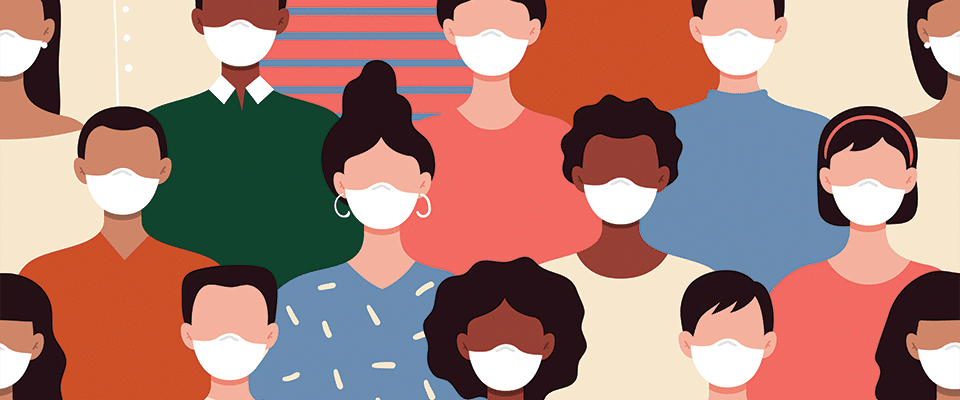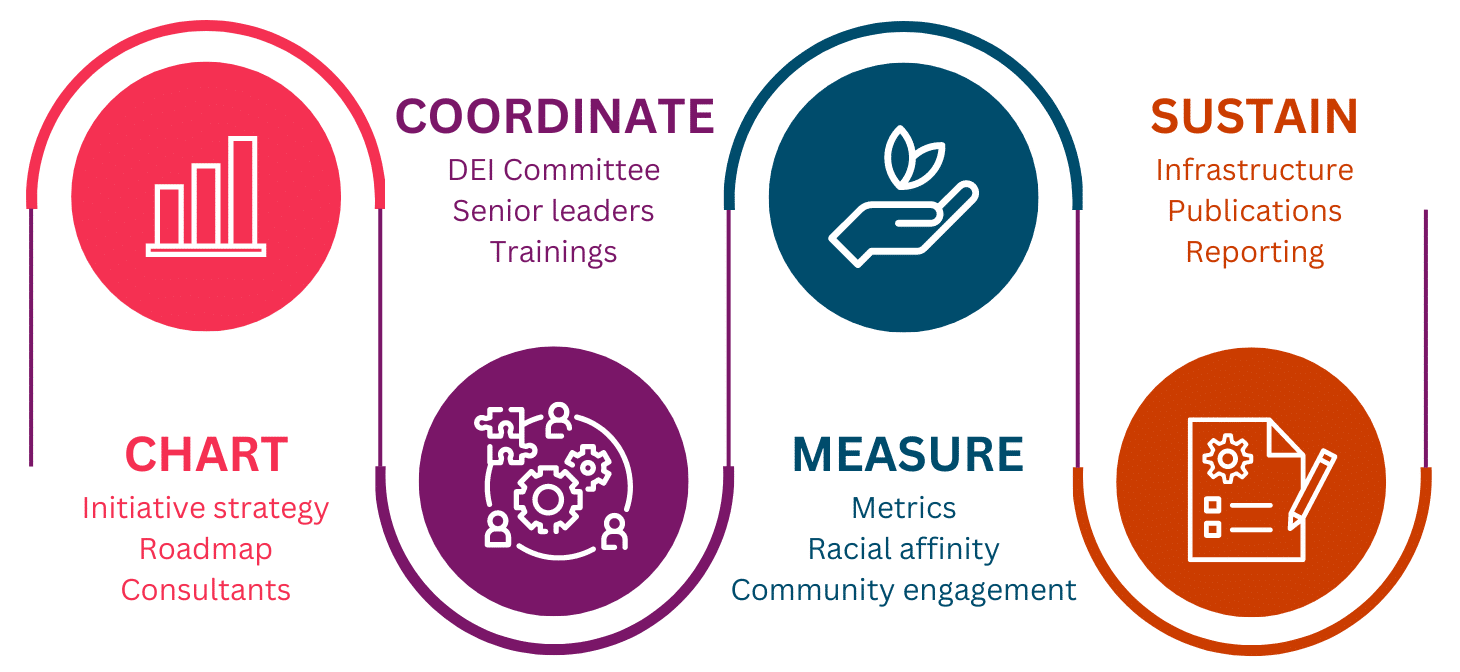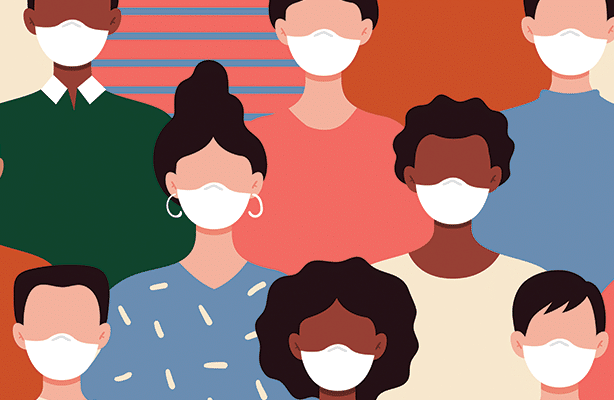
Healthcare Institutions
The IARA project investigates new and existing strategies for antiracist transformation in the healthcare sector. This research focuses on the organizational practices and institutional policy changes that directly address the racial gap in health outcomes. This work aims to support healthcare sector decision-makers and practitioners in achieving lasting and sustainable change at the institutional level.
Why is antiracist research in healthcare needed?
Systemic racism is deeply embedded in U.S. healthcare and economic systems, and it remains pervasive throughout social policies and organizational practices alike.
Finding effective antiracist interventions is as challenging as it is essential. The existing field of research on systemic racism in healthcare is largely focused on showing how racism impacts the social determinants of health and economic well-being of people and populations. Unfortunately, there is very little research on how to correct these inequities.
What do healthcare organizations need right now?
Three months into the COVID-19 pandemic, the world witnessed the murder of George Floyd, sparking a wave of racial justice demonstrations. In response, many healthcare organizations announced new antiracist change goals. Yet, many of these commitments lacked effective strategies and accountability mechanisms. Healthcare organizations need support to identify, implement, and measure antiracist interventions at the institutional level.
What can healthcare organizations gain from IARA’s 2023 report?
Supported by a grant from the Robert Wood Johnson Foundation, IARA conducted a one-year study of existing antiracist interventions in healthcare organizations and a review of authoritative evidence for institutional accountability. The report titled ‘From Words to Action: Institutional Accountability and Transformation‘ was published in March 2023.
IARA’s pioneering case studies identifies five organizational levers necessary to close racial disparities in healthcare outcomes and produce long-term sustainable institutional transformation:
- Buy-in and continued engagement from leadership
- A shared understanding and use of explicit language to define structural racism
- Effective organizational infrastructure
- Clearly defined metrics
- Building internal capacity and professional development
Read the report to learn more about these five must-have’s for institutional change, as well as other recommendations for healthcare organizations striving for antiracist transformation.
Meet the researchers
Key takeaways from the 2023 report

Antiracist accountability compass
Based on the cross-thematic findings from the qualitative data analysis and literature review, IARA proposes this accountability compass as a baseline to guide healthcare organizations.
The compass follows a holistic, four-dimensional path for antiracist organizational change and accountability. Each dimension is composed of three levers from the qualitative grounded theory of the project.
Discussion with Research Fellow Angel C. Rodriguez
In this discussion in the IARA Changemaker series, Dr. Vabren Watts, Director of Equity at Health Affairs sits down with Angel Rodriguez, IARA Research Fellow, and co-author of the forthcoming report Antiracist Institutional Change in American Healthcare Organizations.
Press play for a discussion on the opportunities and obstacles in implementing antiracist change initiatives in healthcare organizations and other key findings from the report.

Related articles on healthcare

Implementing Anti-Racism Interventions in Healthcare Settings
2021
In the years following the murder of George Floyd, many health organizations declared anti-racism commitments and shifted their core values in an attempt to reform hospital-based interventions to implement antiracist change. To date, however, there remains a gap in providing a systematic review of these efforts to understand which interventions actually worked. In this paper, authors conducted an international systematic review for anti-racist interventions in healthcare to: (1) increase understanding of these efforts for the sector and (2) analyze the anti-racist interventions’ potential to influence policy and patient care.

Association Between Racial Wealth Inequities and Racial Disparities in Longevity Among US Adults and Role of Reparations Payments, 1992 to 2018
2022
This cohort study aims to identify, address and quantify the relationship between longevity ( “all cause mortality”) and wealth as it relates to Black individuals versus white individuals. Furthermore, the study then models how reparations payments to the black community could potentially affect the longevity ( “all cause mortality”) gap between Blacks and whites. By further exploring the direct connection between reparations and health outcomes, the authors attempt to specifically describe the role of monetary resources in determining health inequities across racial groups.

How Structural Racism Works — Racist Policies as a Root Cause of U.S. Racial Health Inequities
2021
Racism is not ahistorical and neither are U.S. health care and public health institutions and practices. Drs. Bailey, Feldman and Bassett argue that structural racism is a legacy of African enslavement and affects both population and individual health. They offer three examples of structural domains that continue to lead to poorer health outcomes for Black Americans: (1) redlining and racialized residential segregation, (2) police violence and the carceral state, and (3) unequal health care.

3 Principles for an Antiracist, Equitable State Response to COVID-19 — and a Stronger Recovery
2021
Historically, at times of economic crises, governmental leaders often cut funding for social programs and create tax cuts for the wealthy, worsening social conditions for marginalized populations, in particular the racial wealth gap. At the peak of the pandemic in 2021, the federal government’s American Rescue Plan unprecedentedly offered state governments the opportunity to address systemically racist policies, the root cause of racial disparities caused by Covid-19. In this paper, the authors provide an antiracist framework for state officials to craft policies that promote equity and racial justice.
Recent News
-
Reporting on DEI in higher education: 5 key takeaways from our webinar
Three researchers offered journalists tips and insights to help strengthen news coverage of college DEI efforts and legislators’ push to restrict or ban them.
-
Five books and a podcast on sports, patriotism, and racial justice
This reading list from the Institutional Antiracism and Accountability Project explores the intersection of sports and racial justice, in the lead-up to their panel on March 19.
-
The State of Black America
During a searching discussion at the Harvard Kennedy School (HKS) on the “State of Black America,” historian Khalil Gibran Muhammad opened with a trenchant warning: “We are facing uncharted waters.”



